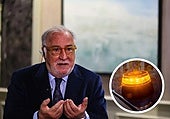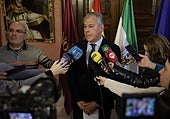Russia bets on Iran amid Middle East crisis
Moscow and Tehran prepare a "great strategic agreement" for military and security cooperation, similar to the one the Kremlin maintains with North Korea
Rafael M. Mañueco
Corresponsal. Moscú
Monday, 30 September 2024, 20:10
In the context of the Israeli Army operation in Lebanon and the annihilation of the Hezbollah leadership, Russian Prime Minister Mikhail Mishustin traveled to Tehran on Monday and met with Iranian President Masud Pezeshkian and First Vice President Mohammad Reza Aref. Moscow and Tehran have been preparing the content of a major "strategic agreement" for months. On the 18th, just after former Defense Minister and head of the Russian Security Council Sergei Shoigu traveled to Tehran to address security issues, President Vladimir Putin approved the proposal from the Ministry of Foreign Affairs.
According to various sources, it aligns with the model of agreement signed with North Korea, which includes military assistance. The document could be definitively signed at the end of October when Pezeshkian will travel to Russia to participate in the BRICS summit.
The United States and other Western countries have accused Iran of supplying drones and ballistic missiles to Russia for use in its offensive on Ukrainian soil in exchange, supposedly, for technology to develop its nuclear weapons program, Su-35 fighter jets, Mi-28 attack helicopters, and Yak-130 pilot training aircraft.
But Tehran denies it, claiming that its position regarding the conflict in Ukraine is "neutral," despite evidence of Shahed drones being used against targets in Ukraine. Iran, along with North Korea, are practically the only countries supplying weapons and ammunition to Russia for its war against Ukraine.
Destabilization
From Moscow, meanwhile, Kremlin spokesman Dmitry Peskov joined the condemnations expressed the day before by Foreign Minister Sergei Lavrov, deploring the death of Hezbollah leader Hassan Nasrallah in bombings carried out by the Israeli Army. In his opinion, "these actions significantly destabilize the situation" throughout the Middle East (...) and "cause a large number of casualties by targeting residential areas."
Officially, the Moscow government framed the trip within the development of relations between both countries, giving "priority to expanding commercial and economic cooperation, diversifying mutual trade and its structure, as well as continuing joint work to increase it."
This was assured by Mishustin through his Cabinet's Telegram channel. According to his words, "Russia is sincerely interested in taking our cooperation to a higher level and giving it a new more significant implementation." He emphasized the need to "create favorable conditions for carrying out large joint investment projects in various fields such as transportation, industry, energy, trade, and cultural cooperation."
These issues, he declared, "will be resolved by a joint Russian-Iranian commission on commercial and economic cooperation." According to Mishustin, the volume of trade between Russia and Iran in the last seven months increased by 6.5%. Pezeshkian, for his part, said that "it is essential to strengthen bilateral relations in the context of Western sanctions" against Iran and Russia.




-kNIF--1200x840@RC.jpg)